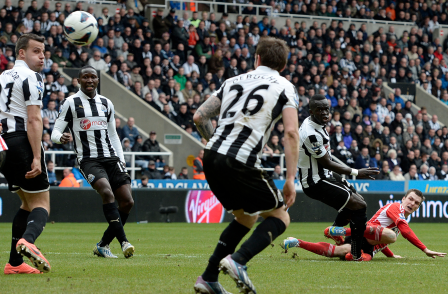
The Telegraph journalist who sparked a paper-wide ban from Newcastle United says the prospect of being shunned by football clubs is an industry-wide threat.
Telegraph journalists were banned from attending Newcastle matches, press conferences and interviewing players after Luke Edwards reported that the club was on the verge of a “damaging split”. Manager Alan Pardew has since denied the allegation, describing it as “insulting”.
Edwards, who has covered the club for more than 12 years (previously for the Newcastle Journal), had warned the Telegraph that Newcastle was unhappy with the report.
He told Press Gazette he had shorthand and text message evidence to support his report – and that was enough for his newspaper, which refused to take down the article or apologise.
Despite the ban he is planning to attend Newcastle’s final home game of the season – against Arsenal on 19 May – outside the press area.
“Writing stories like these as a football reporter you are accused of deliberately shit-stirring,” he said.
“This is a story I wrestled with writing… Because, I thought, what is it going to do?
"But my whole rationale for writing it was that this was a boil that needed to be lanced. That there were problems behind the scenes, that there was a resentment growing.”
Edwards has had trouble with Newcastle United before while at the Journal – but not under the club’s current ownership.
“I did an illegal interview once – well, I spoke to a player without the press office’s permission and was banned for that,” he said.
“I didn’t manage to speak to a player straight after a game so I rang a player that I knew – I knew from school – and because they’d just introduced these new media rules I was banned.”
On that occasion Edwards and the Journal “sat tight” before the situation blew over. And he is hopeful that the Telegraph and football club can come to a resolution in the summer.
Edwards said this situation is not rare and that football clubs generally feel they “hold the keys” in their dealings with newspapers.
“It does happen at other football clubs. I think the difference is that this one’s been made very public,” he said.
“It is a danger. It’s indicative of an industry that’s trying to get greater control over the messages that come out and what is written about their football clubs and their products.”
And he said it can be worse for regionals. “[Clubs] expect the local paper to be like fans and show loyalty and not criticise them. And they can actually be a lot more sensitive to criticism from local newspapers.
“I think every sports journalist out there, local or national, will take an interest in this because it could happen to them.”
Email pged@pressgazette.co.uk to point out mistakes, provide story tips or send in a letter for publication on our "Letters Page" blog

